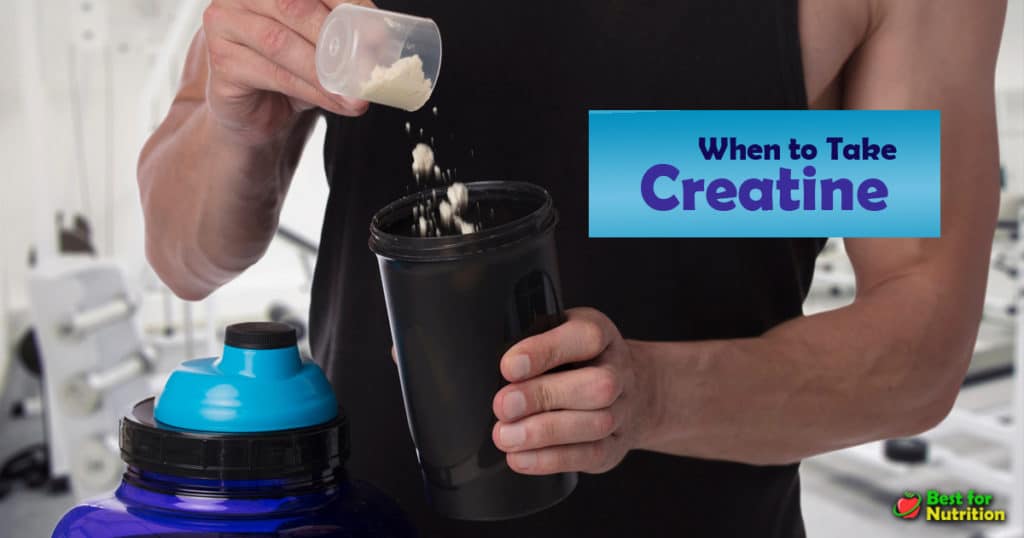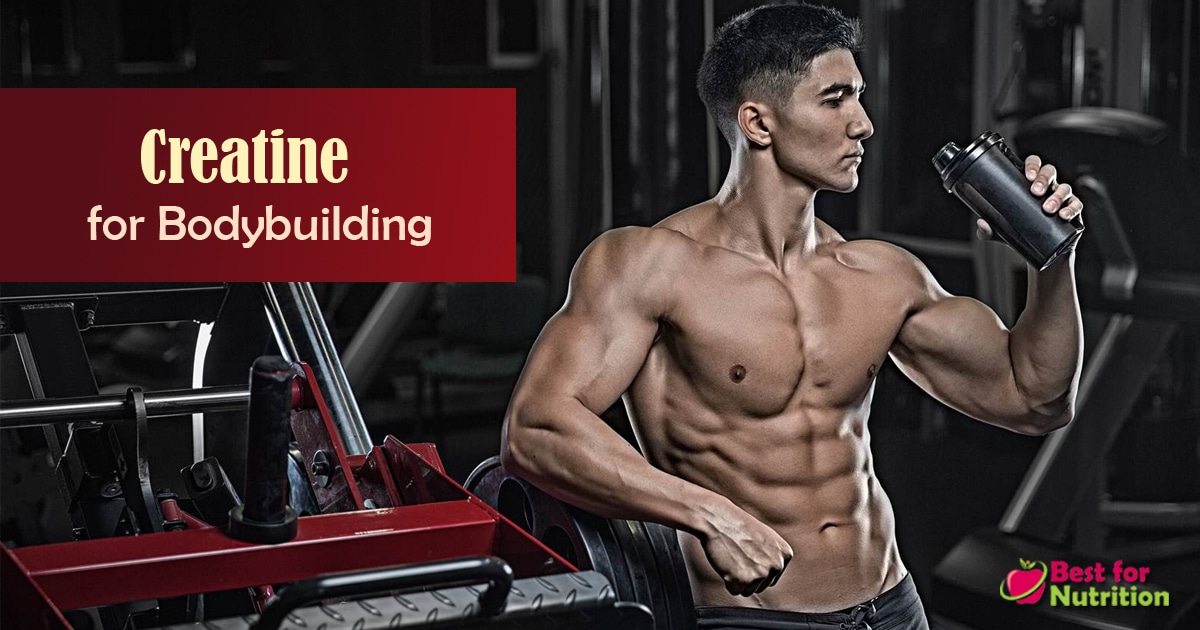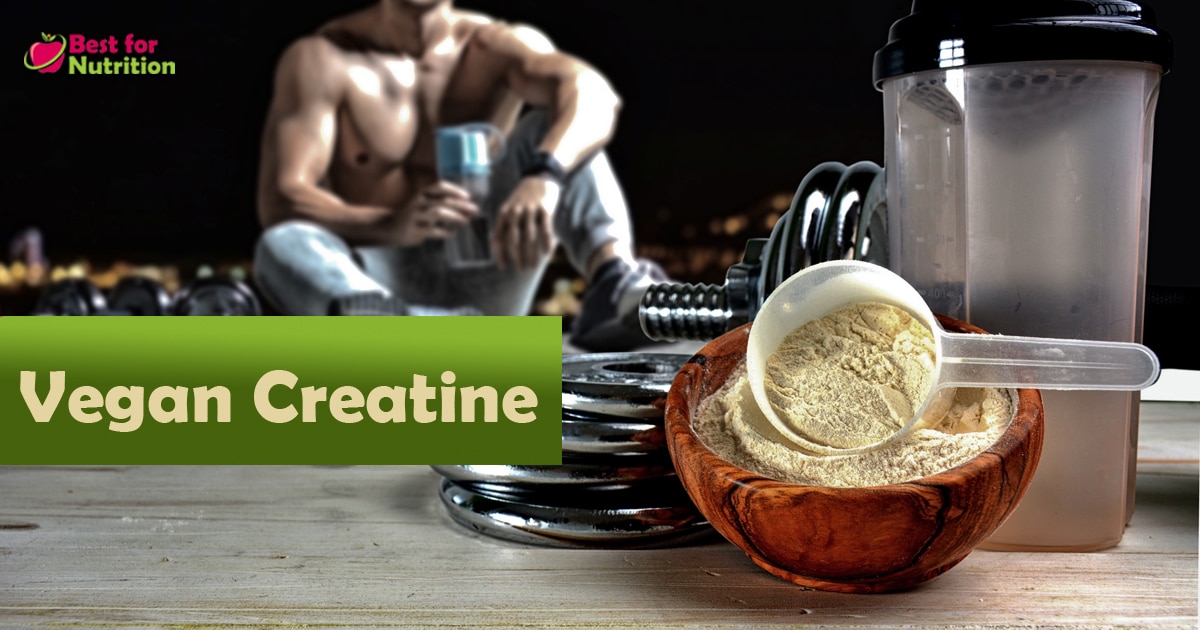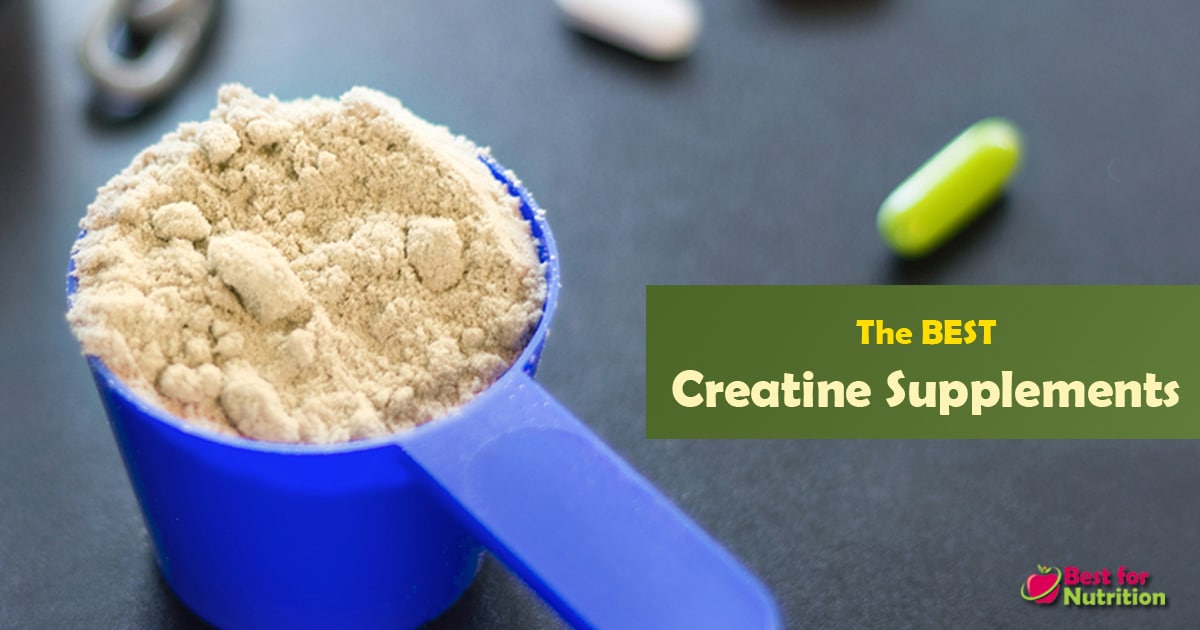Supplementing creatine in your diet can definitely give an extra edge to your training routine.
It is a performance-enhancing aid that has shown to improve the strength and volume of the muscles. In other words, creatine helps build bigger and stronger muscles.
It not only improves the efficiency of your workout, but it also has an added perk of aiding in muscle recovery after a training session (1).
For maximum effectiveness, it is vital that the creatine is taken at the right time and at the correct dosages. So when is the best time to take creatine- before a workout, during the workout, or after the workout? When do you take creatine on rest days?
Let’s find out all we need to know about getting the best out of creatine supplements for our workouts!

What is Creatine?
Creatine is a natural compound found in our body, mostly in the muscle cells, in the form of phosphocreatine (2). It’s made up of three non-essential amino acids namely, glycine, arginine, and methionine.
Unlike essential amino acids that have to be supplied from the diet, non-essential amino acids are synthesized in the body. Your body creates enough creatine from these amino acids to meet your basic needs for it.
Creatine can also be obtained from your diet. Animal meat is one of the best sources of creatine. Unfortunately, there isn’t a vegan source of creatine, so vegetarians will need dietary supplements if they wish to increase their creatine intake.
The most popular form of creatine supplement is Creatine Monohydrate (3). It is also the most well researched (4). Other forms are available like creatine ethyl ester, in the market, but their superiority over creatine monohydrate is lacking evidence.
Summary: The amino acids namely, glycine, arginine, and methionine together form creatine. Creatine is naturally produced in the body and is available from food sources as well.
Why take Creatine – 7 Workout Benefits of Creatine
Bodybuilders and athletes may also have increased creatine requirements and can benefit from creatine supplementation.
Here are 7 ways by which creatine supplementation boosts your workout performance and helps you achieve your muscle-building goals:
Provides Extra Energy
Creatine offers a quick burst of energy for heavy lifting and high-intensity workouts. Creatine supplements help increase the level of ATP in your muscle cells.
ATP (Adenosine Triphosphate) is the basic ‘energy currency’ of your body. During high-intensity workouts, the ATP in the muscles gets depleted quickly.
The creatine in the muscles replenishes the ATP stores thus providing extra energy for your training sessions. So, more creatine means more ATP energy molecules can be generated for boosting your exercise performance.
Boosts your Endurance
Creatine supplements will increase the creatine stores in the muscles (5). This significantly improves the working capacity of the muscles thus increasing the duration of your training session.
Studies have shown that creatine is most effective for activities that involve repeated short bouts of high-intensity physical activities like HIIT, jumping, sprinting, or cycling (6). In fact, creatine’s workout benefits can be enjoyed by everyone, regardless of sport, gender, or age.
Increases Performance and Strength
Adding creatine to a training program can enhance your performance by close to 50%! There is a notable increase in your muscle strength as well.
For example, a bench press one-rep would go up by up to 43% and weightlifting performance by 14%, when compared to training without the supplement (7).
Increase Lean Muscle Mass
Short-term creatine supplementation is also known to increase lean body mass.
A 2003 study from the Maastricht University in the Netherlands, the researchers evaluated the effects of both creatine loading and prolonged creatine supplementation in 20 study subjects (8).
The study revealed that the added supplementation not only boosted performance but also brought about a gain in fat-free muscle mass.
Short And Long Term Muscle Growth
Adding creatine supplement along with consistent physical training involving resistance exercises, help in building up actual muscle growth.
Creatine promotes the release of IGF-1 and HGH hormones which are involved in muscle synthesis (9), (10).
Increased creatine storage leads to water retention. This increased cell hydration leads to larger muscles as the water gets drawn into them, making the muscles look bulkier and bigger (11).
Reduce The Breakdown Of Muscle
Creatine is also known to help reduce the breakdown of muscle protein (12).
This along with its effect on muscle growth would be an added bonus for athletes and weight trainers who are looking into not just strengthening their muscles but adding in more definition.
Enhance Muscle Recovery
Creatine supplements have shown to help muscles recover faster after a workout session. This reduces post-workout soreness (13).
It is important for us to know that creatine also has many other health benefits such as reducing the effects of brain injuries, maintaining heart health, and reducing bone loss (14).
Therefore, taking a low daily dosage of creatine can improve the lifestyle of an individual regardless.
Summary: Creatine supplements can greatly raise the energy stores of the muscles for boosting exercise performance and endurance. Not only does it increase the lean muscle mass, but it also helps the muscles to recover faster after a workout.
When is the Best Time to Take Creatine?
You can take creatine any time of the day and still reap many of its benefits. This helps build up your creatine stores in the muscles.
But for maximum effectiveness in enhancing workout performance and muscle building, it is best to time your creatine intake based on your workout schedule, as well as, the duration and intensity of your training.
Creatine timing generally falls into four categories:
- Before a workout
- During a workout
- After Workout
- On Rest Days
Taking Creatine Before a Workout
In general, it is recommended to take your pre-workout meal or supplements at least half an hour to an hour before your workout. But in the case of creatine, it may be better to take it just before your workout.
You can take this with a glass of fruit juice or milk depending on your preference. The combination of creatine with carbohydrates or protein seems to improve the effectiveness of creatine.
The rise in insulin improves the absorption of creatine into the muscle cells. Warm milk may be the best choice as the creatine powder not only dissolves better in it, you also benefit from the additional amino acids from this complete protein source.
A 2006 study done in Melbourne, Australia, noted that taking the supplement closer to the time of exercise, either shortly before or after, showed a greater advantage in terms of strength and lean body mass (15).
The idea behind taking the supplements before a workout is to increase the store of creatine in the muscles prior to a training session.
During a short, high-intensity exercise, the creatine helps in adding extra energy for the workout. The increased creatine levels will intensify performance, as the creatine will be readily available for a longer period of time.
If you’re supplementing for the first time, the best way to optimize the store is to take about 5g or 0.3g/kg of body weight; 4 times daily for the first 5-7 days.
On reaching the optimal level, a daily dosage of 3-10g (based on body size) would then be enough to maintain the desired higher level of creatine (16). Those with a greater body mass and vegetarians will need to take a larger dosage to maximize their stores.
Summary: Taking your creatine supplement shortly before the workout will help flood your muscles with creatine, thus offering you a quick energy boost that helps power through your session.
Taking Creatine During a Workout
The use of the creatine supplement midway through the exercise routine could be beneficial for stretching the routine as it helps increase the endurance to exercise.
Energy is used for muscle contraction (17). Heat is a byproduct of this metabolism. Creatine supplementation is reported to cause increased water retention in the muscle cells (18). So this cell hydration can help regulate the body temperature and allow for a more comfortable routine.
Supplementing with creatine during your workout is recommended if your workout lasts for an extended period of time. This supplementation will offer an additional boost of energy and helps you power through the entire workout.
This increases your capacity to do your workouts and not tire out as easily or be as sore.
Summary: Supplementing midway during a workout offers you an added energy boost that increases your endurance. This is especially useful during an extended workout session.
Taking Creatine After a Workout
This school of thought takes into account the ability of creatine to reduce muscular inflammation after a workout and its effect on muscle recovery (19).
Supplementing after the workout helps to replenish the depleted creatine stores, and make you ready for the next session (20).
Additionally, taken with carbohydrates, creatine is known to assist in increasing the glycogen storage in the muscle cells after a workout. This glycogen is simply stored energy in the muscles which will help delay fatigue and improve performance (21).
A study conducted by faculty from Nova Southwestern University, Florida In 2013 attempted to answer this question (22). They divided nineteen young healthy male bodybuilders into two groups, one taking the supplements before a workout and one taking them after.
Although their results showed that supplementing creatine post-workout had an edge to pre-workout.
Summary: Supplementing with creatine after a workout will help in muscle recovery and rebuilding. It helps quickly replenish the creatine used up during the workout.
Taking Creatine on Rest Days
The objective behind supplementing on rest days when we aren’t exercising is just to maintain the high level of creatine in the muscles.
The loading phase is when we initially take high amounts of creatine (around 20grams), which rapidly raises the level of creatine in the muscle over several days. The loading phase ensures that the creatine saturates the muscle cells enough to benefit exercise performance.
Research shows once creatine stores in the muscle are elevated, it generally takes 4–6 weeks for creatine stores to return to baseline (23). After which a lower maintenance dosage (3-5 grams) is recommended to be taken daily (24).
Summary: Taking a lower maintenance dose at any time, even on rest days, builds up the level of creatine in the muscles. This is especially important during the creatine loading phase.
Frequently Asked Questions (FAQs)
How much Creatine Should I Take?
Many who supplement start with a loading phase, which is to rapidly increase the muscle stores of creatine. The loading phase is beneficial when you initially start supplementing.
The most commonly followed dosing program involves an initial loading phase of 20 g/day for 5-7 days (25). This can be split into 4 servings of 5gms each, throughout the day (26).
This is followed by a maintenance phase of 3-5 g/day for differing periods of time (1 week to 6 months).
Should you take Anything Else with Creatine?
Taking the creatine supplement along with some carbohydrates or protein has been found to help retain the creatine in the muscle cells better (27).
It also appears to increase the muscular uptake of creatine, although its effect on performance may not be greater than using creatine alone.
It’s advised to keep yourself adequately hydrated throughout the day when using creatine supplements, as the water gets pulled into the muscle cells.
The Final Note
With all it’s proven benefits, creatine is a great option as a nutrient supplement for athletes and weight trainers who want to get a step up in their regimen and boost performance.
You can take the creatine supplement right before your workout if you plan on doing a short, but high-intensity workout. But otherwise, taking it after a workout or even midway through the routine appears to be slightly more effective than before your workout routine.
To get the best out of your creatine supplementation, it is important to take it every day. Taking the supplements even on days when you’re not working will ensure the levels of creatine stays high in the muscle cells, keeping you ready for a rewarding workout session anytime.





